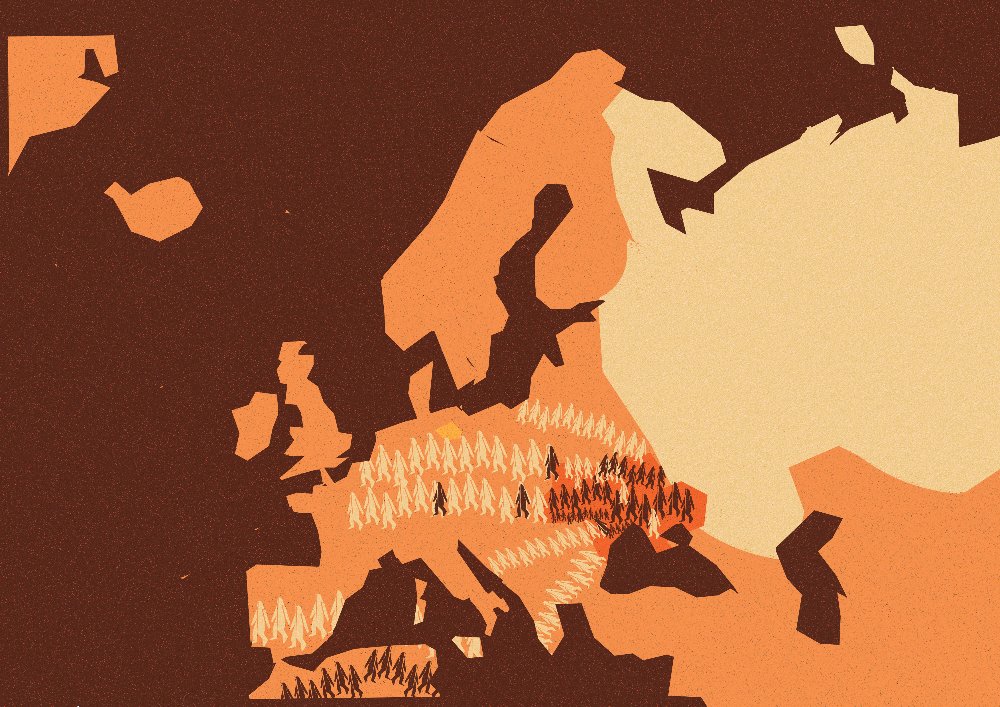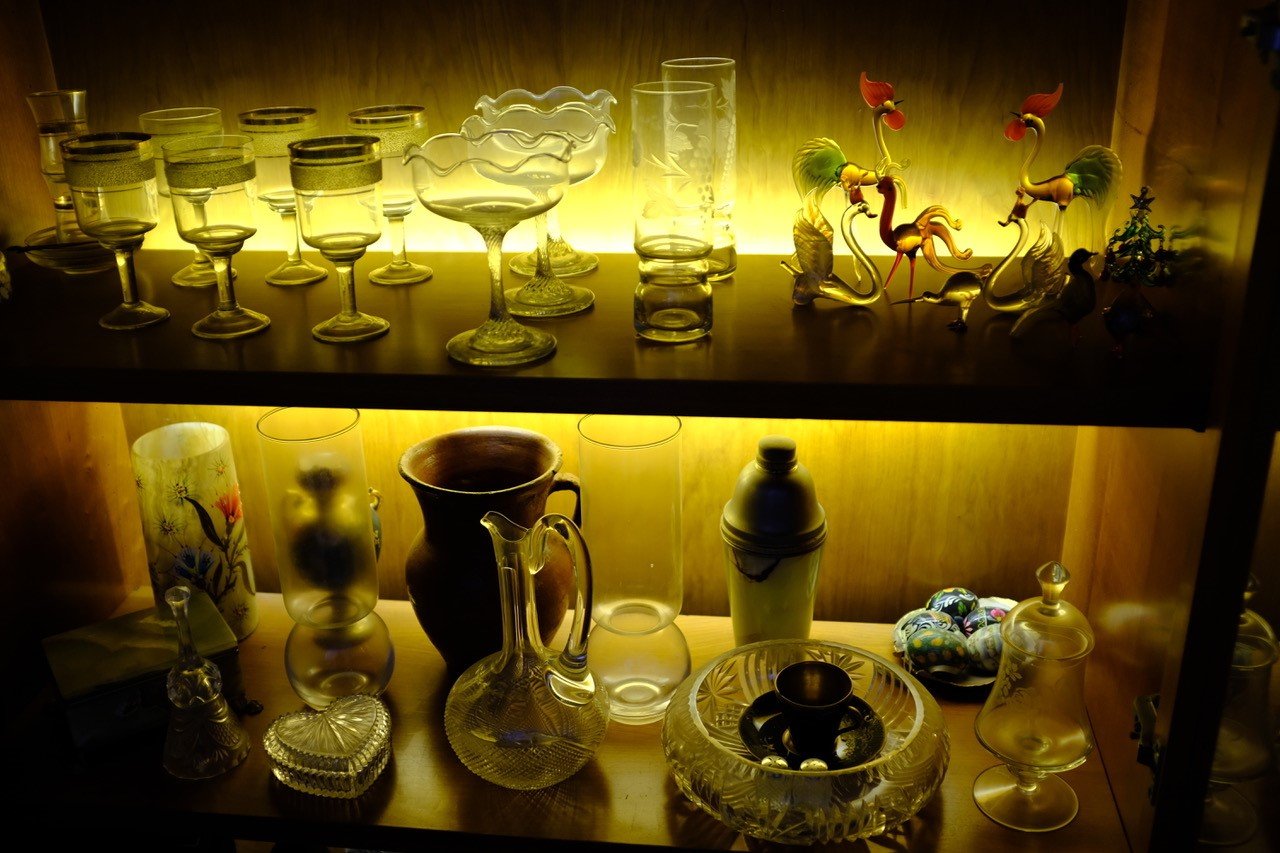This is the third in a series of portraits from our home city, of Berliners affected by the war in Ukraine. You can see all the portraits as we publish them here.
By Jacob Sweetman:
You can tell Yuriy Gurzhy's a singer. It's there in the way his voice rises when he's excited; talking about the success of his seminal Berlin parties, Russendisko, that spawned a phenomenon he'd never expected; or about hearing Lou Reed's 'New York' album for the first time as a teenager in Kharkiv. That was on a tape, recorded itself off another tape, taped in turn off a tape belonging to a guy who'd brought a bagful of these black plastic gemstones back from a trip to the States.
“17 is an exciting age, anyway,” he says, noting that he is now getting to experience it again vicariously through the eyes of his son. But his late teens were spent watching the fall of the Soviet Union from within, and he was compiling his own soundtrack to it.
There was rarely much decent information about the music he listened to. Sometimes the name would be written on the sticker or on the case. Sometimes a year, but often not. He heard the Velvet Underground's 'White Light White Heat' a while later, realising slowly it was the same guy singing.
It was like he was collecting together all the pieces of a jigsaw, and only years later did they start fitting together to form a bigger picture. He was listening to bands like Dead Can Dance, to Throbbing Gristle, but also Grazhdanskaya Oborona, Egor Letov's seminal band from the Omsk underground.
“I don't know if these guys ever intended to sound like punk rock, but they had no chance. They couldn't play, the instruments were shit, the recording machines were shit, too. Probably just a tape recorder. But they were big, and they were banned in the late Soviet years so they really gained popularity in the early 90s as martyrs, suddenly able to play huge venues.”
This was a logical process, the natural emerging of a post-Soviet culture, but one that had begun a long time before, even from the Ukrainian folk songs his father knew, collected by people passing through villages, listening to whatever they could and learning it to preserve them, like Alan Lomax did in the Tennessee mountains a world away but at a similar time.
Gurzhy's dad would sing at family parties, playing on a seven string gypsy guitar, or on an old piano with his right hand much stronger than his left. They'd all join in.
His Dad was not very good on guitar, he says, but they didn't have an accordion at home, at which he was much better.
But it was his dad's secrets that comprised his greatest loves. He was married to a Jewish woman, had banned, home-printed samizdat texts at home, and spoke fluent Ukrainian, none of which were fully apparent to the young Yuriy. He wanted to protect his family, he didn't want to attract attention to them. Yuriy's maternal grandfather and grandmother were dentists who also saw patients at home, illegally.
Yuriy's father liked the Russian songwriters of the sixties, but while far from pop, he wasn't into the “heavier stuff” Yuriy would discover later, with cryptic meanings hidden behind obscure metaphors.
“I remember hearing bands from Lviv in the early 90s and... 'woah'. You understand the language perfectly, you understand every word, but sometimes it's like, '...who's this partisan fighting again?' There weren't too many possibilities to find out more. So you have a song, and you listen to the song, and then one day maybe you get to meet the guy who sings it.”
It was the passing on of musical traditions. He calls it a folkloric process, and is also what he has spent the last couple of decades contributing to with his band, Rotfront; making pan-European music, rooted in ska and klezmer, with in-jokes about Berlin and Barcelona, dotted with hip-hop flourishes and proto-dancehall toasts, and horns that brighten corners otherwise occupied by rumbling bass lines.
He jokes that they are thought of as German when abroad, but as a migrant band in Germany, though he later says that he wasn't really joking.
It's because he ties together all these loose ends. It's the way he is wired, curating the contents of what he calls his “internal hard drive.”
So his efforts to help his home city in its time of terrible need is centred around these connections, his ability to string together the different parts of his world into a cohesive whole, organising, communicating.
And it's largely the same thing, anyway.
Yuriy is good company, we drink strong coffee, we talk about music, mostly. Even though he's exhausted.
But the city he and his forebears called home looms over the conversation.
“Kharkiv was home to the new Ukrainian literature, until most of these writers and poets were killed in the '30s. So I remember wondering, when studying, where is all the good stuff? But there wasn't anything else, because they were all fucking killed.”
Kharkiv is as far from the Russian border as Potsdam is from Berlin. It's only 20 miles or so, nothing. Kharkiv is under attack as we speak, as we talk of old bands and mutual interests. Rockets rain down upon the city every day. A third of its residents are thought to have fled including most of his family, but he's still got many friends there.
He's been writing a diary for the Tagesspiegel since February. The latest post when we meet is about a trove of old photographs taken by his father, comparing them with ones from today, with holes in buildings that were once whole, with dust and rubble lying like a shroud across previously clean, friendly looking streets, all shot in sharp, Kodachrome colours.
It is, he says, an attempt to give some context to German readers. He says all we really need is some empathy.
Then he echoes what so many people have said to me recently.
“I know how it works sometimes, you just turn numb. At some point you just can't react to these images any more, the numbers are just so abstract.”
It's then his voice drops half an octave into a rich baritone; like when he talks of his cousin's nine month pregnant wife sheltering 24 hours a day, seven days a week, in a cellar with 200 others, hiding from the Russian bombardment. And the tone continues, though he speaks more wryly of gigs that will likely never happen, but that were already being planned, in Mariupol and Kyiv and in Donbas for this Spring.
You can tell Yuriy Gurzhy's a guitarist, though he's better than his dad ever was. It's there in the times he doesn't know what to do with his hands; he rubs the drying skin on his forehead; he fusses around his neat Prenzlauerberg kitchen; he plays with the pastry sat in front of him.
He gets up and sits down, he gets up and sits down. He's being pulled in a lot of directions at once.
Yuriy grew up speaking Russian. He's spoken more and more Ukrainian for years now, but remembers when it was still an alien concept.
“One of my classmates switched to Ukrainian in the fourth year, I think. It was really weird, until I realised that he actually comes from a Ukrainian speaking village... so in a way he closed the circle. But I remember what a shock it was, because it was after the holidays he'd spent back in the village of his grandmother and he came back and spoke Ukrainian to all of us. And people were like 'are you fucking kidding?' But we learned to respect that pretty soon. He was the first one.”
He says he sometimes feels ashamed for having Russian as his native tongue. That's another thing. But he also says he feels guilty all the time anyway, even though he's been living through a whirlwind for the last fifty days.
“I've not done that much. I still feel like it's not enough. I hate myself...” It's not self-pity, though, just a rumination. “But also on good days I feel like I'm doing more than ever. So there's strength, and there's an energy coming from out of... I don't know where, but probably just of necessity. And as long as it keeps me going and going.”
He bristles when I ask him about hearing the news of February 24th.
“The war has been going on for eight years”, he says.
“I played Donbas a couple of times, I saw the places affected by the war, the people affected by the war. It's not 'coming', it was already there, we are just in the escalation phase.”
I try to say I meant this, but I too still think of this war as being a sudden development. He cuts me off. It's something he has to say in every interview he does, and he's doing a lot of interviews now we are all suddenly interested in Eastern Europe again.
We talk of the importance of music to all this, of how in the modern world it can cause tangible change in terms of instant distribution, of exchanging information, and the fundraising capabilities unheard of a decade ago.
We always come back to music.
“I think the real music freak was my grandpa, my mothers dad,” he says. “He hated all this songwriter shit, he was into pop. And when I was growing up we lived in the same apartment, six of us, grandparents, parents, my sister and me. I was sick a lot as a kid and I'd stay home and my grandparents stayed at home too.”
Yuriy still has his grandfather's tape deck at home in Berlin.
He then tells me of a friend who arrived in Leipzig with her son, a 14 year old, who'd had to leave his guitar behind. Yuriy managed to sort one out for him in four minutes.
“It was a personal best” he says, allowing himself the small consolation that he's helped, because he knows of an instrument's inherent importance.
His grandfather wanted to pursue a career in music as a young man, but then after the 2nd World War he became a dentist. His violin had been stolen, and he probably thought he needed to do focus on survival, to do something less fun, more solid instead.
So I ask Yuriy if he thought his path to becoming a musician was, in a way, making up for the dreams he missed out on.
“Absolutely,” he says. “Both him and my dad, I had it from both sides. I had no choice.”
His inheritance is in the knowledge passed down that those strings, however loosely strung and amateurishly struck, that that neck, however wide or well attached to that body, however battered and chipped - and that the voices, singing in whatever language is at hand, holding a simple melody for a fleeting moment - are as important, sometimes, as anything else.
***
Jacob Sweetman is a writer and sports journalist, at home in Berlin. His work has appeared in 11Freunde, The Guardian, The Berliner Zeitung, Wisden amongst others. His writing about 1.FC Union Berlin can be mostly found here and he has a website here
Emily Sweetman is an illustrator, at home in Berlin. She is a genius, and her work can be seen here










